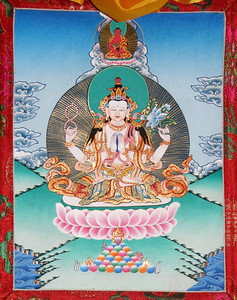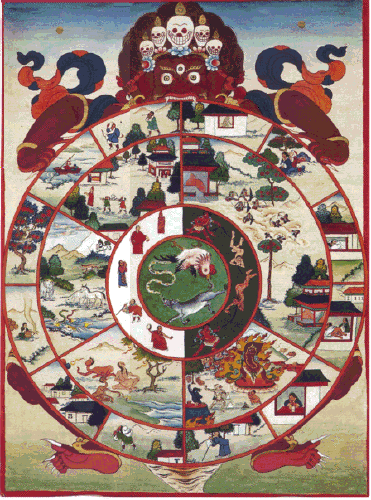
OM MANI PADME HUM
A Teaching by Jetsunma Ahkön Lhamo
In order to understand the Buddha’s teachings one has to understand cause and effect relationships, and in order to understand cause and effect relationships, one has to understand the two extremes of eternalism and nihilism. In this nation we are actually afflicted with both nihilism and eternalism. Culturally we have absorbed them. They are part of our mindstreams, they are prevalent throughout our culture, and they are hard to spot.
Eternalism is the belief that we will continue as we are, based on a belief in our self nature and its continuation. It is like postulating a stick with one end: it begins at some place and then continues on forever. Nihilism is the belief that nothing essentially exists. It says that things come together in some sort of natural, physiological way or through some chemical means, but that there is no real order to it or no context within which an evolutionary pattern exists. It is the belief that there is nothing outside what one sees with one’s eyes or feels with one’s hands or smells with one’s nose. It is the belief in the possibility, in our case, of experiencing cause without experiencing effect.
This is not the textbook definition of nihilism, but it is the description of nihilism as we experience it within our minds. For instance, it is possible for us to know the teachings of the Buddha and to see their logic, yet have our actions and lifestyle be inconsistent with that belief. We may understand that compassion reaps good results and brings us closer to enlightenment, so we exhibit kindness and have faith. Yet within our minds we think judgmentally about others and hold hatred and desire. We think that it is acceptable to act kindly toward a person even if at the same time we are thinking we would like to have that person’s clothes or that we don’t like that person. This is actually a form of nihilism, because we feel that what matters is what people see, not understanding that even what remains in our thoughts and feelings also produces results. We don’t really understand that cause and effect relationships occur from the subtlest levels to the grossest of levels, and are the underlying fabric of cyclic existence. We do not understand, therefore, our own nature and that all things are an emanation of our minds. We practice nihilism constantly because we believe that the only thing that is counted somehow in the book of countings (whatever that might be) is that which is seen and can be judged by others.
We are content to live with that kind of thinking, never realizing the terrible results that it produces. We continue to engage in activity that is not conducive to enlightenment, because we do not understand the depth and profound effect that cause and effect has upon us. We may act in a kind way when people are watching but in our minds, in our secret places where no one is watching, we are selfish, judgmental, uncaring, and jealous. All of these qualities we allow to exist within our minds, and we do not understand that if they exist within the mindstream they will also somehow appear in our physical reality. Holding hatred in our mindstreams, or jealousy, selfishness, grasping, feeling needy constantly, feeling that we must have something in order to be content, acting in a selfish way that is inconsistent with the Buddha’s teaching, these things produce the same results that physical activity of that kind produce, even though we may not see right away the effects that will surely ripen.
The Six Realms of Cyclic Existence
The Buddha teaches us that there are different causes that we hold within our mindstreams that create the circumstances by which we are reborn in the six different realms of cyclic existence.
Contrary to the popular New Age philosophy that says we always achieve a higher rebirth, or that since we are human beings now we can always count on being human beings in future incarnations, the Buddha teaches that we achieve rebirth according to the content or fabric of our mindstreams. For example, if we hold a great deal of hatred or anger, we can be reborn in the lowest realms called hell realms. These realms are extremely uncomfortable; they have a great deal of heat and fire or extremes of cold that are unbearable. It is so unbearable there that it is impossible to practice. It would be like trying to meditate while someone is sawing off your knee. All you can think about is yelling and screaming and how to get out of there quickly. That is the nature of the hell realms.
If you experience a great deal of desire, grasping, and neediness, you will be reborn in what is called the hungry ghost realm. This realm is so filled with longing that the nonphysical beings there have mouths as tiny as a pinhole and their stomachs are as large as Mount Mehru. It is impossible to satisfy them. It is the experience of insatiability. Beings there are so empty and unable to take in what is needed.
If we experience dullness, stupidity, or ignorance, we will be reborn in the animal realm. Animals are considered to be incapable of the kind of thought necessary to make fully aware decisions. They fall prey to whatever sufferings man might visit upon them. Oxen that must pull heavy carts all day with very little nourishment, animals that must endure testing, these animals are unable to save themselves and they suffer horribly. Animals in the wild are eaten or helplessly pursued by bigger animals. Even our pets do not know how to take care of themselves. If we feed them they are fed, if we forget them they are forgotten.
To be reborn in the human realm is considered the most auspicious of circumstances because here it is possible to practice the Buddha’s teaching and experience true awakening, Although it takes a great deal of merit to be reborn in the human realm, there is also a negative cause for human rebirth, and that is doubt. As humans we constantly experience doubt. It is so pervasive that we do not understand how great our doubt is. If we really examine ourselves, we will discover that we think and feel differently from the way that we believe intellectually. We may follow a certain philosophy, but we never follow any philosophy consistently because we are so filled with doubt. It is the same in following Buddhist teaching. We will follow it externally, but not consistently until we have come very close to realization and can understand for ourselves fully and completely about cause and effect relationships.
If we experience a great deal of jealousy and competitiveness, if we have a warlike quality to our minds, we will be reborn in what is called a jealous gods’ realm. Beings there have a great deal of power with super-normal experiences. They are very strong, competing constantly in war. There is no peace, no security, no time to think or feel or love. There is only a constant need to guard oneself against hurt and attack, and a compulsive need to be aggressive about maintaining whatever you have that seems to be yours.
The last of the six realms is the gods’ realm. It is considered to be the highest realm because it is the most pleasurable and the most blissful. The beings there are extremely beautiful with gorgeous fragrances, brilliant colors, and music that is so pleasurable that if we were to hear it, there would be instant healing. Bodies of the gods are pure and perfectly sweet. There is not a bit of decay, sweat, bacteria, aging or any processes that produce the foul smells we have. It is beauty beyond what we can understand, completely free of ugliness or decay. Pride is the main cause for being reborn here, and even though the gods live for thousands of years, life is not permanent there. It actually takes a tremendous amount of good karma and pure virtue to be reborn in the gods’ realm, but while there you use up all your accumulated good karma very fast, like a big V8 engine burning gas going up hill. Suddenly after a very long life span, decay sets in. One’s accumulated virtue becomes exhausted and death approaches. It is horrible to them because they who have experienced nothing but beauty, sweetness, bliss, gorgeous music, and celestial food are about to experience terrible suffering. This impermanence is the predominant suffering of the gods’ realm.
We as humans have within our mindstreams all of the seeds of the peculiar sufferings and the unfortunate qualities associated with the six realms of cyclic existence. The Buddha cautions us not to take this teaching symbolically, but to take it absolutely. He could actually see the six realms and could remember having lived in those realms. Having achieved the precious awakening, he was able to recall how he moved from these realms into enlightenment The head of our lineage, His Holiness Penor Norbu Rinpoche, has said that if you could only part the curtains of your inability to see, if you could only see for one moment what the six realms of cyclic existence were like and how you have come and gone in each of the realms, and what you have experienced and what you are yet to experience because of the qualities inherent in your thinking if you could understand this you would do nothing but recite the mantra OM MANI PADME HUM again and again. You would never stop.
The mantra of Chenrezig is OM MANI PADME HUM. Chenrezig is the Buddha of Compassion, and has within his mindstream a clear and pure crystal awareness, which is the same as the mind of enlightenment. Inherent within that mindstate are the qualities that bring about the end of rebirth in all of the six realms. Constant mindfulness of Chenrezig, and learning to generate one’s mind as Chenrezig through the use of visualization, mantra, recitation and pure intention, can bring about the end of rebirth in cyclic existence, even in one lifetime.
The logic here is that in the practice you are the one who generates yourself as the Bodhisattva Chenrezig. You accomplish this pure mind state in order to be of benefit to sentient beings. The real end of suffering therefore can be understood as your capacity to generate yourself as that Bodhisattva of Compassion, thereby becoming the cause for the end of all suffering. In so doing, one brings about the end of one’s own suffering as well.
The mantra of Chenrezig, which is OM MANI PADME HUM, has six syllables. Each syllable has the ability to eradicate causes for rebirth in each of the six realms, because the mantra itself and each of the syllables is considered to be a miraculous condensation of wisdom. Through the activity of Guru Rinpoche we are able to experience in the hearing or reciting of the syllables and visualizing ourselves as Chenrezig, the perfect purification of the causes for rebirth in all of the six realms of cyclic existence. This is absolutely possible. It is promised that if you practice this every day you can achieve the end of rebirth in the lower realms. And if practiced in conjunction with other practices it is part of a proven technology to end suffering in all of the realms.
© Jetsunma Ahkön Lhamo








